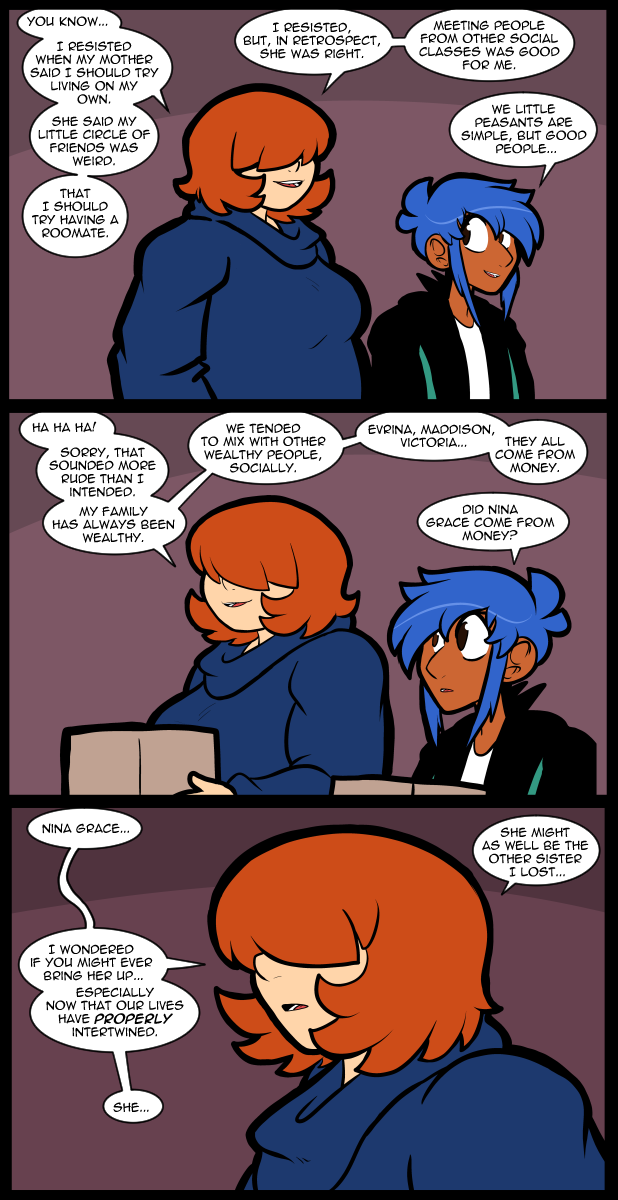2198 From Money.
Patreon
Subscribestar
Comic Vote
Reddit
Wiki
Twitter @betweenfailures
I’m really tired all of the sudden. If there’s anything important I wanted to talk about I can’t think of it right now, so I’ll just leave you to go on about your lives. Have a good one.


24 Comments
Finally we get the story we’ve all wanted to know. Nina’s backstory and history with the librarian.
wait, did I miss a plot twist? SHIT! Ok, my night is shot to hell, back to page one, reread the whole thing again, see what else I missed!
*Insert every popcorn eating, chair setting up meme in existence*. OHHHHH, dis gonna be gud!
That last sentence reminds me of ‘The Child We Lost 1963.’
Looks like a sad song. This tale is likewise sad.
I think it was Erst Hemingway who wrote a very sad story in three lines.
“Far Sale
Baby shoes
Never been worn”
This is likely as sad as some of the things that were mentioned-
This is a book, which was partly inspired by a letter written during the 1994 [genocide in Rwanda]:
We Wish to Inform You That Tomorrow We Will Be Killed With Our Families
[The author of this [1998] book is Philip Gourevitch].
“Have a good life” seems a worthy enough statement, mate. Take care of yourself in turn. That weary fatigue’s a right arse.
It’s interesting. I believe-
While some cultures see the word, “peasant”, as a perjorative, or a slight, there are some cultures that see “peasants” as a positive or hero-type of word.
I think in Russia, + in what used-to-be the USSR, [the idea of the peasant] is seen as a hero-like person, or valued type of person,…almost like- “the backbone of our society”…and a person whose actions and good…moral actions are seen as “things that we all should try to emulate”.
I think, to some people- “a peasant”, is a like-able, hard working guy, a pal, + a regular-type of guy or person,…otherwise- the type of person that the Italians like to call- a “paisan”.
The peasants are simple, but happy people. Once a year, we put on our best rags and dance to welcome springtime, when much, much fewer of us die of starvation!
Hee hee hee!
In days before the industrial revolution there were relatively small classes of the nobility, military, clergy and merchants. Everyone else was peasants. Once the industrial revolution really got rolling in the United States and people could build massive fortunes then the wealthy elite kind of migrated niche of nobility. In the mythology of many Marxist governments there is an en-noblement of the common person as an aspect of their internal propaganda. As used above, it just means “people with less money than us”. This goes on even in the smallest communities.
Thanks for the info. :)
Have a good rest Jackie!
More Alex backstory? Sign me up!
I’m glad she apologized in panel two. That thing about “other social classes” had a “first half hour of My Man Godfrey” vibe about it.
(ETA: A vibe which she didn’t mean to create.)
Yeah, a cliffhanger Friday will take it right out of you. :D
I feel like I’m missing something contextual here. (I’m fighting a migraine atm, so it’s entirely possible.) Did her mother say she should try living on her own, or that she should try having a roommate? Those aren’t the same thing so I’m a bit confused.
She suggested both a separate articles.
Rest well Jackie. Thought I’d tell you my new motto. Carpe intervegilium (I think). Sieze the Nap!
I remain entertained by your inventiveness. Please continue to delight me with your characters.
“Evrina, Maddison, Victoria. They all come from money.”
EVRINA?? Now I have to sit down for a spell.
Also Maddison, surprising but in that case I’m guessing her family might not think much about what Maddison does.
How is it that you put more emotion into Alex, without us seeing her eyes, than most artist put into any characters?
I’ve always paid attention to the subtle changes in people’s expressions as a way to try & understand their emotions since I don’t always pick up on vocal cues.